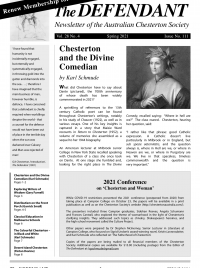
A new book by Gary Furnell, The Hardest Path is the Easiest: exploring the Wisdom literature with Pascal, Burke, Kierkegaard and Chesterton (Connor Court, $29.95), has just been published. It looks at the Old Testament books known as Wisdom literature, Proverbs and Ecclesiastes, through the eyes of Chesterton and the three other significant writers noted in the sub-title. In this article Gary reflects on the years of preparation that went into the writing of the book.
I began making notes for a thematic treatment of Proverbs (later adding Ecclesiastes) in 2010 but didn’t complete the project until mid-2021.
The long gestation and gradual development—over 11 years—is intrinsic to the project because as I read and wrote, thought and re-wrote, I realised that long stretches of time are essential to any examination of wisdom. Humans exist in time and we learn via instruction and experience, “little by little,” as Qohelet observes in Ecclesiastes.
Both Proverbs and Ecclesiastes seem somewhat loose collections, almost inchoate in their gathering of observations, warnings and laments. But themes are discernible and these themes provided a structure.
Each got a chapter: The Search for Wisdom; Four Follies to Avoid—Rebellion, Adultery, Lazyness and Pride; Wisdom and Wealth; Wisdom and Assets; Wisdom and Government; Wisdom and Relationships; Wisdom and Reverence. There are few areas of life left untouched—and unimproved—by Hebrew wisdom.
My first desire was to become less of a nincompoop by studying the wisdom literature. Later, I hoped to have something printed to benefit my sons and daughters. I knew I wasn’t—and never would be—sufficiently shrewd to provide commentary on Proverbs and Ecclesiastes, but I recognised four writers whose reverent sagacity was profound: they could provide commentary, with my prose like a grey grout framing their brilliance.
I had been reading Pascal for nearly two decades and Chesterton, Kierkegaard and Edmund Burke for the best part of a decade before making my first notes. Re-reading them and selecting relevant passages was a labour of love. They provided an abundance of excellent — and beautifully expressed — aphorisms, observations, insights and assessments.
It helped that Pascal, Burke, Kierkegaard and Chesterton came from different eras and nations. Wisdom is humanity’s mutually-held inheritance, and having writers — each very different individuals — whose lives crossed four centuries and three languages affirmed this common inheritance. Each of them had sought wisdom, and each found it in rare measure.
When I started writing it became obvious that I had to establish limits. As Chesterton understood, limits are essential: they aid creativity and provide focus.
The book couldn’t be too long or academic in style or tone. Proverbs pictures Wisdom going into the streets inviting everyone to her feast, so the book had to be accessible, including people unfamiliar with philosophy or the Bible.
I had to avoid a needless multiplication of passages drawn from my four commentators because brevity aids engagement. Also, it was appropriate to try to write attractively because this makes learning and recall easier, as the wisdom literature itself notes.
The Hardest Path is the Easiest is a paradoxical title because Proverbs and Ecclesiastes abound in paradoxes: for example, God is sovereign but we are still responsible; we have spirit but we live and die like animals; we are always human but we can de-humanise ourselves; we live in time yet exist beyond time. Paradoxes keep two different things in view, accepting the difficulty — and the mystery — of their concurrency. Chesterton, of course, was accused of a profligate use of paradoxes.
Many people today are uneasy with mysteries and paradoxes, especially religious paradoxes. The wisdom literature is currently unfashionable but for two millennia the easily remembered sayings of Proverbs and Ecclesiastes were the common wisdom of European, Mediterranean, Byzantine and Levantine cultures. We’ve lost much of that wisdom, but it’s worth reclaiming, first for our own good and the good of our family, and then for the good of our broader communities.
Wisdom brings direction, healing and hope. And, as the wisdom literature repeatedly emphasises, it also brings lasting joy.
Despite these benefits, there will be opposition from the opinionated, the proud, the clever, the greedy and selfish. Wisdom itself admits this opposition. Anyone seeking wisdom must be resilient and determined. Not everyone has the required stamina and sustaining vision.
The Hardest Path is the Easiest is dedicated to the few who seek — steadfast and unerringly — Spirit and wisdom. Kierkegaard called them “Knights of Faith.”
